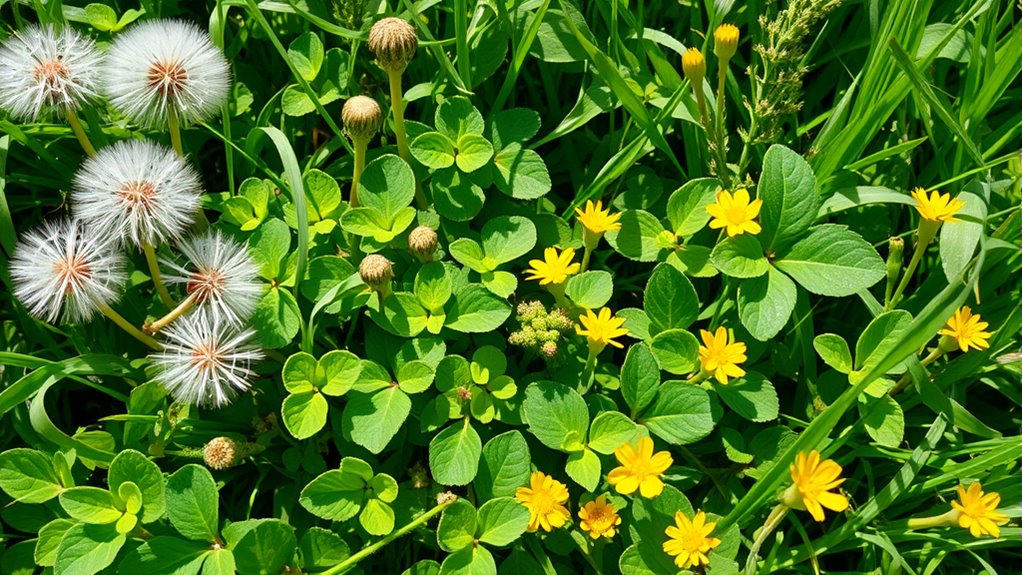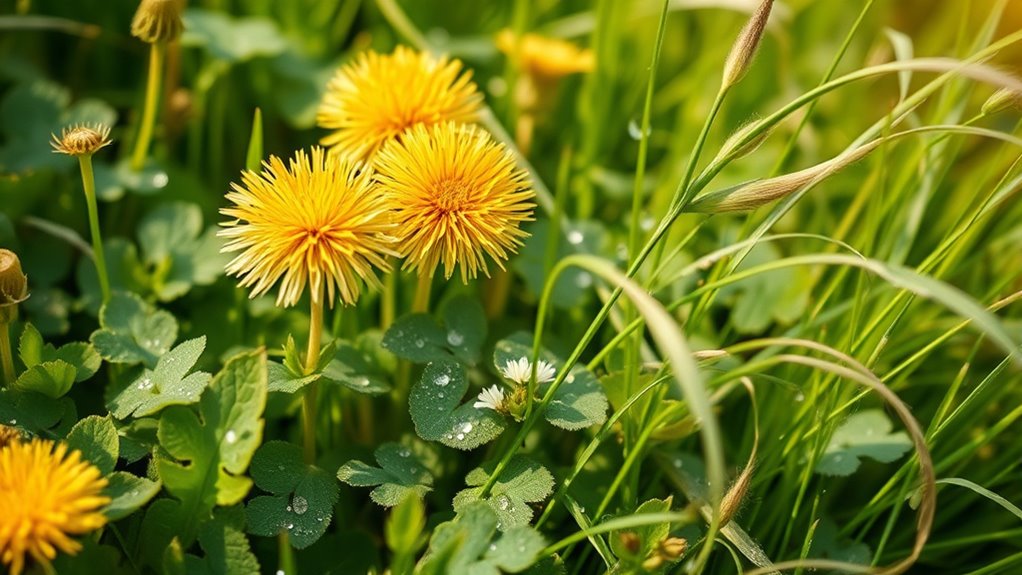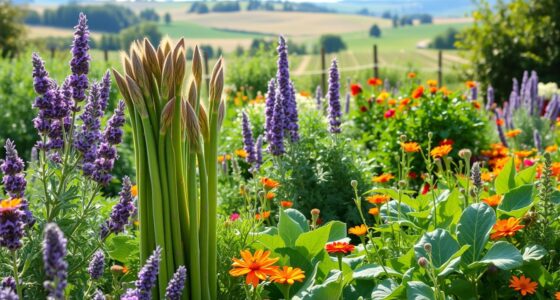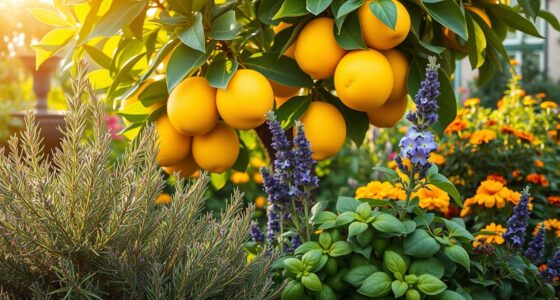Weeds like dandelions and clover can be your garden allies. They attract beneficial pollinators and provide essential early-season food for bees and butterflies. Clover fixes nitrogen in the soil, reducing your need for fertilizers, while dandelions’ deep roots improve soil structure. By letting some weeds grow intentionally, you support a healthier, more resilient garden ecosystem. If you’re curious about turning weeds into natural assets, you’ll discover more ways they can benefit your garden as you explore further.
Key Takeaways
- Weeds like dandelions and clover attract pollinators, boosting garden productivity and supporting healthy plant reproduction.
- Clover fixes nitrogen in the soil, naturally enriching it and reducing the need for chemical fertilizers.
- Dandelions’ deep roots improve soil structure by breaking up compacted ground and enhancing water absorption.
- Allowing certain weeds provides habitat for beneficial insects, promoting biodiversity and ecological balance.
- Recognizing weeds as allies encourages sustainable gardening practices and enhances overall garden resilience.

Have you ever considered that weeds might actually be friends rather than foes? It’s a surprising idea, but many common weeds like dandelions and clover play crucial roles in your garden’s health. Instead of rushing to eliminate every weed, you might find that some are actually working in your favor, especially when it comes to pollinator attraction and soil improvement. These plants can draw beneficial insects, like bees and butterflies, which are essential for pollinating your vegetables and flowers. Their bright yellow blooms and nectar-rich flowers provide a vital food source, especially early in the season when other flowers haven’t yet blossomed. By allowing these weeds to grow, you support a thriving ecosystem, encouraging pollinators to frequent your garden and boosting your overall plant productivity.
Moreover, many weeds contribute significantly to soil improvement. For instance, clover is a legume that fixes nitrogen from the air and converts it into a form plants can absorb. This natural process enriches the soil, reducing the need for chemical fertilizers and boosting the vitality of your garden beds. Dandelions, often dismissed as pesky, have deep taproots that break up compacted soil, allowing water and nutrients to penetrate more easily. Their roots also draw up minerals from deep underground, which they then deposit in their leaves and flowers. When these weeds die back or are chopped down, they return organic matter to the soil, creating a healthier environment for your desired plants.
You might find that intentionally leaving some weeds can be a strategic move. They act as natural soil conditioners and habitat providers for beneficial insects, helping maintain a balanced garden ecosystem. Recognizing the soil-enriching capabilities of weeds can transform your approach to gardening and reduce reliance on external inputs. Instead of viewing weeds solely as enemies, you can see that they can serve as natural allies. By understanding their benefits—such as attracting pollinators and improving soil health—you can manage your garden more thoughtfully. This approach encourages a more sustainable, low-maintenance garden where weeds are not just tolerated but appreciated for their contributions. Embracing these plants as part of your gardening toolkit can lead to a more resilient, vibrant landscape, where nature’s helpers do much of the work for you. So next time you see a dandelion or a patch of clover, consider the possibilities they bring and how they might be working in your garden’s favor.
Frequently Asked Questions
Can Weeds Improve Soil Health Naturally?
You might wonder if weeds can improve soil health naturally. The answer is yes, especially if you compost weeds properly, which helps return nutrients to the soil. Additionally, incorporating weed-friendly planting allows beneficial weeds like clover to fix nitrogen and enrich your garden. Just be cautious to avoid invasive weeds spreading uncontrollably. Proper management turns weeds into valuable allies, boosting your soil’s robustness and supporting healthy plant growth.
Are There Weeds That Attract Beneficial Insects?
Did you know some weeds naturally attract beneficial insects? You might find that certain plants, like dandelions and clover, serve as pollinator attraction hubs, drawing in bees and butterflies. At the same time, they can provide pest habitat, keeping harmful bugs away from your main crops. By allowing these weeds, you create a balanced ecosystem, enhancing garden health while supporting pollinators and natural pest control.
How Do Weeds Compete With Garden Plants?
You might wonder how weeds compete with your garden plants. Weeds often grow quickly, using resources like water, nutrients, and sunlight, which can hinder your desired plants’ growth. This increases plant competition and reduces weed suppression. To keep weeds in check, you need to manage their growth actively, ensuring your garden plants have enough resources to thrive. Proper mulching and regular weeding help minimize plant competition and promote a healthy, productive garden.
Can Weeds Be Used for Medicinal Purposes?
You might be surprised, but many weeds can be used for medicinal purposes. You can turn weeds into herbal remedies or plant-based medicine to support health naturally. Dandelions, for example, are known for their detoxifying properties, while clover has traditional uses for inflammation. By harvesting and preparing these plants correctly, you can harness their healing powers and incorporate them into your wellness routine.
What Are Eco-Friendly Ways to Control Invasive Weeds?
Ever thought of throwing a weed party? Instead, you can try eco-friendly weed suppression techniques like mulching or hand-pulling, which are far more charming. Companion planting works wonders too—planting certain species to outcompete invasive weeds naturally. These methods are sustainable, cost-effective, and kind to the environment. So, ditch harsh chemicals and embrace these eco-friendly strategies—your garden will thank you with a lush, weed-free paradise.
Conclusion
So next time you see a dandelion or clover in your yard, remember they’re more than just weeds—they’re your garden’s allies. Did you know that clover naturally fixes nitrogen in the soil, reducing the need for fertilizers? By embracing these plants, you support a healthier, more sustainable garden. Instead of pulling them out, consider partnering with nature’s helpers. Together, you can create a vibrant, thriving outdoor space that benefits everyone, including your garden’s future.









